 Wukesong Ice Sports Center in downtown Beijing will serve as the training base for ice hockey teams at the 2022 Winter Olympic Games. (LIU SHUAIYE / FOR CHINA DAILY)
Wukesong Ice Sports Center in downtown Beijing will serve as the training base for ice hockey teams at the 2022 Winter Olympic Games. (LIU SHUAIYE / FOR CHINA DAILY)
Five years since assembling a strong organizing committee, Beijing has entered the final phase of preparations for the 2022 Winter Olympics, with the development of COVID-19 countermeasures high on its agenda.
Despite the freezing winter chill, excitement for the 2022 Games is heating up in the capital and surrounding areas with organizers, property owners and planners busy completing venues, finalizing operational details and drafting health and safety protocols as the final winter before the 2021-22 Olympics season unfolds at a challenging time.
As a highlight of venue preparations in three Games zones — Beijing’s downtown, its suburban Yanqing district and co-host Zhangjiakou in Hebei province — the recently completed renovation of the National Aquatics Center and the National Indoor Stadium from summer to winter sports venues highlights the readiness and confidence of 2022 organizers to meet all preparatory deadlines on schedule.
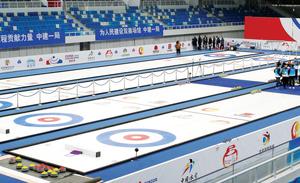 This undated photo shows Beijing 2022 curling venue the Ice Cube (converted from the National Aquatics Center). (QIN CANSONG / FOR CHINA DAILY)
This undated photo shows Beijing 2022 curling venue the Ice Cube (converted from the National Aquatics Center). (QIN CANSONG / FOR CHINA DAILY)
“It’s highly possible that the Winter Olympics will be running in 2022 with the pandemic still around, which is a big challenge,” said Zhang Jiandong, executive vice-president of the Beijing 2022 organizing committee, during a recent online project review meeting with the International Olympic Committee and International Paralympic Committee.
“Yet, we are positive to push ahead with our preparatory work on schedule and make all necessary adjustments to deal with the pandemic’s impact to make sure that we will be ready in October 2021 to enter the Games-time operational stage,” said Zhang, who is also a vice-mayor of Beijing.
The aquatics center, known as the “water cube” for hosting swimming at the 2008 Summer Olympics, has been transformed into an “ice cube” for curling in 2022 after finishing redecoration and renovation work that included filling the main pool with removable and reusable steel structures.
The refurbishment of the indoor stadium, a venue for gymnastics in 2008, was completed on Dec 12 following the addition of an Olympic-standard ice rink in the main hall and an indoor rink to the north of the venue, covering a total area of 98,000 square meters, to host men’s ice hockey and training sessions in 2022.
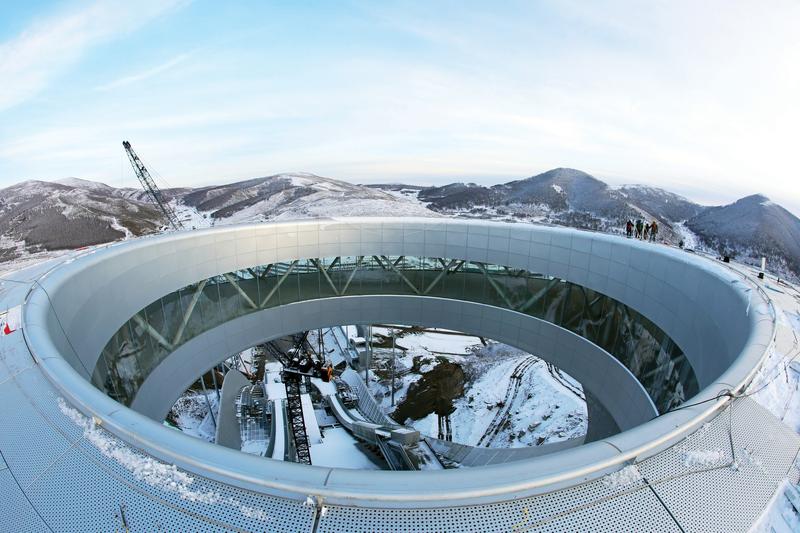 This undated photo show the National Ski Jumping Center in Zhangjiakou. (WU DIANSEN / FOR CHINA DAILY)
This undated photo show the National Ski Jumping Center in Zhangjiakou. (WU DIANSEN / FOR CHINA DAILY)
All of the 13 competition venues, newly built or renovated, will be finished by the end of this month.
Devising COVID-19 countermeasures in conjunction with international and domestic health experts, the IOC and IPC, as well as international sports federations, has been prioritized for the next phase, according to Zhang.
The enthusiastic public response to Beijing 2022’s volunteer program has also boosted morale within the organizing committee, which celebrated the five-year anniversary of its establishment on Dec 15.
More than 980,000 people from home and abroad have successfully applied to fill 39,000 volunteer vacancies for the 2022 Olympic and Paralympic Games, according to the organizing committee.
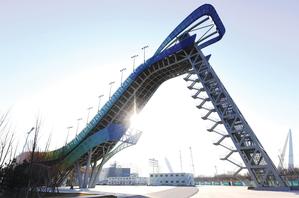 This undated photo shows Beijing's Big Air ramp. (PHOTO / XINHUA)
This undated photo shows Beijing's Big Air ramp. (PHOTO / XINHUA)
With 95 percent of the applicants aged between 18 and 35, the volunteer program is expected to leave a legacy for the country’s sports sector in the service and operation of winter events.
“Through intensive and professional training following the recruitment stage, we will prepare our volunteers to the best of their ability for the unique challenges of serving at the Winter Olympics in the face of extreme weather conditions, highly demanding professional skills and COVID-19 prevention measures,” said Teng Shengping, director of Beijing 2022’s volunteer department.
With the pandemic unlikely to be contained effectively worldwide anytime soon, Beijing 2022 organizers reckon that they still face an uphill battle to work out solutions for an adapted sports testing program, while drawing up virus-prevention protocols involving travel control, quarantine and social distancing.
According to a joint decision made by Beijing 2022, the IOC, IPC and winter sports’ global governing bodies, the original plan of hosting 15 Winter Olympic and five Paralympic test events through April 2021 had been scrapped due to the pandemic’s impact on international travel and quarantine policies.
An adapted sports testing program has since been adopted by Beijing 2022, which plans to have the Games facilities and services checked and assessed in a simplified way without the large-scale involvement of international athletes and officials.
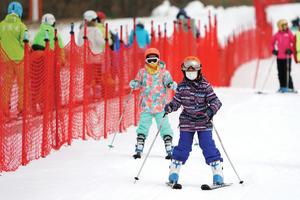 With the Beijing 2022 Winter Olympics fast approaching, the public's appetite for ice and snow sports continues to grow. (PHOTO / XINHUA)
With the Beijing 2022 Winter Olympics fast approaching, the public's appetite for ice and snow sports continues to grow. (PHOTO / XINHUA)
Facilities, timing systems and medical services are among aspects expected to be tested in the flexible program, but not necessarily in a competition format or with international athletes present.
The decision was made following an inspection visit of international federation officials to Beijing 2022 venues last month and the successful staging of a track validation test, known as “pre-homologation”, at the newly built National Sliding Center in Yanqing by the governing bodies of bobsled, skeleton and luge.
The IOC has acknowledged Beijing’s hard work in such difficult circumstances and has pledged to offer all necessary support to help the Chinese capital complete its mission of becoming the world’s only city to host both the Summer and Winter Games.
“With competition venues set to be completed by the end of this year and plans for One Year to Go activities developing, excitement is really beginning to build,” IOC vice-president Juan Antonio Samaranch, who also chairs the Beijing 2022 coordination commission, said after the project review meeting.
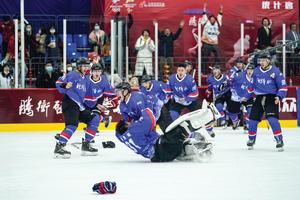 With the Beijing 2022 Winter Olympics fast approaching, the public's appetite for ice and snow sports continues to grow. (PHOTO / XINHUA)
With the Beijing 2022 Winter Olympics fast approaching, the public's appetite for ice and snow sports continues to grow. (PHOTO / XINHUA)
“Acknowledging the difficulties experienced this year, the progress being made by Beijing 2022 has been remarkable.
“This has been reflected through positive feedback from several international federations that have visited Beijing in recent weeks. There will be challenges ahead, however, which is why — through, for example, the COVID-19 countermeasure working group — we are fully preparing for all eventualities.
“To achieve this, the experience and expertise within the local organizing committee, the support from the Chinese and Beijing governments and the close collaboration between all Olympic and Paralympic Movement stakeholders will ensure we are stronger together.
“This will be vital to delivering outstanding Olympic and Paralympic Winter Games in Beijing in 2022.”


